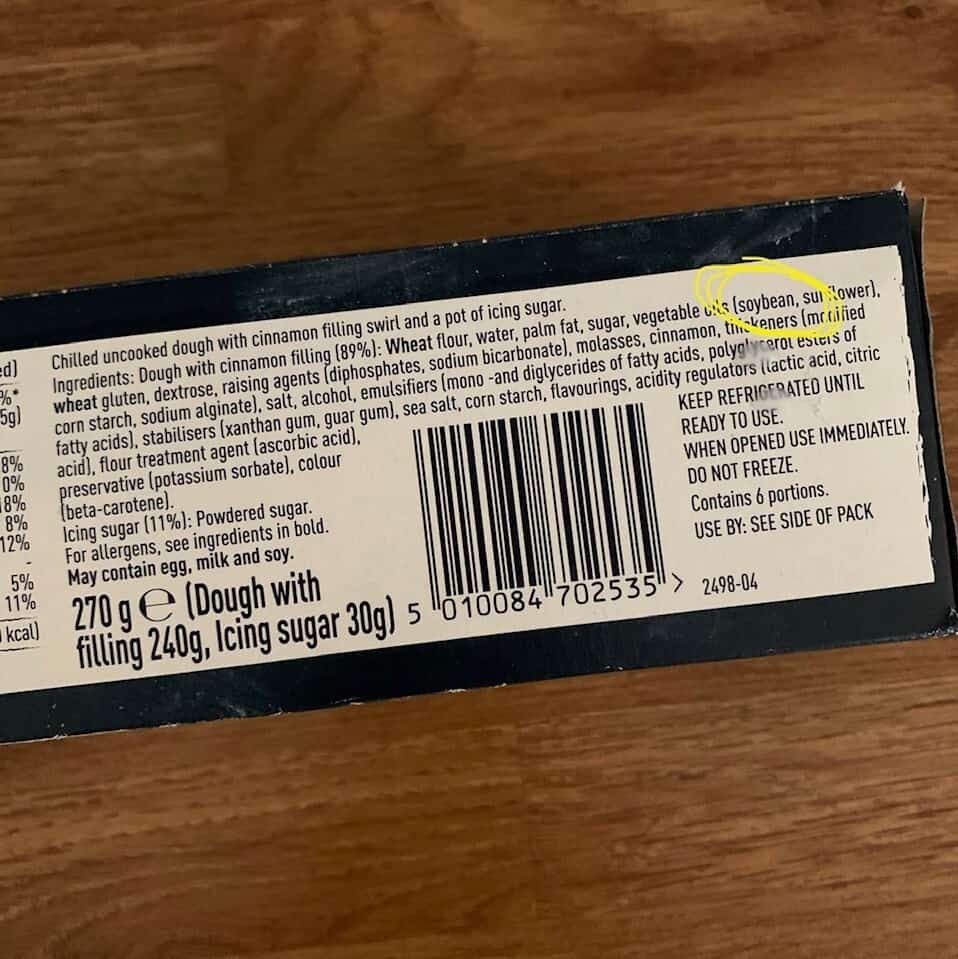Babies with cow's milk protein allergy are often allergic to soya too. For those with peanut allergy, a small number will also be allergic to soya. It could be one of multiple allergies, or soya may be your only allergy. Thankfully, under current labelling laws, soya (or soy, depending on where you are in the world) has to be listed as an ingredient in foods, whether you are in the UK, Europe, the USA, Canada or Australia. This makes it much easier to spot foods that contain soya. But what about soybean oil?
This is a question that came up recently in a group chat I'm in, and it was a question I had had myself a while back after I came across this ingredients label:

I live in the UK, where soya has to be highlighted in bold in ingredients lists. But this food contains soybean oil, which isn't highlighted in bold! Does this mean the manufacturer has made a mistake with their labelling?
I was worried as my daughter is very sensitive to soya and even reacts to small amounts of soya lecithin. So I decided to do some more research. Here's what I found out:
What is Soybean Oil?
Soybean oil is a type of vegetable oil extracted from the soya beans. There are a few different types:
- cold-pressed
- expeller-pressed
- highly refined
Cold-pressed and expeller-pressed soybean oil both contain soya protein. If you are allergic to soya you should avoid both of these.
However, the highly refined type of oil is a different matter. But why is this?
Highly Refined Soybean Oil
Highly refined oils of any sort undergo much more processing than the cold-pressed and expeller-pressed versions. The refining process includes extraction with hot solvents, bleaching and deodorisation. This removes all but trace amounts of soya protein from the oil. And we really are talking miniscule amounts.
A 1998 study found that highly refined soybean oil contains up to 4 micrograms soya protein per 100g. One microgram is a millionth of a gram - a microscopic amount, and not enough to cause an allergic reaction.
To give some perspective, let's compare this to soya lecithin. Most people with soya allergy can tolerate soya lecithin. But because a small proprotion of people do react to soya lecithin, it must still be clearly listed in ingredients on food packaging. In the same study as mentioned above, scientists found soya lecithin contains 2.8mg soya protein per 100g. One mg is a thousandth of a gram - that's a thousand times larger than a microgram.
Soya lecithin - 2.8mg soya protein per 100g
Highly refined soybean oil - 4 micrograms soya protein per 100g
In another study in 2004, a group of people with confirmed soya allergy ate increasing amounts of highly refined soybean oil, up to 10g. Out of the 28 people tested, not a single one had any reaction.
Soya Allergy in the UK? Check out my list of Soya Free Bread
Reported Reactions
There have been very rare reports of people reacting to soybean oil, but only in the following circumstances:
- After receiving IV treatments containing soybean oil (i.e. directly into the bloodstream)
- A baby fed exclusively with amino acid formula containing soybean oil
- One individual had allergic reactions in the night to pillows where soybean oil was used in the manufacturing process
None of these are typical uses. And two of them don't involve eating it!
So thanks to this clinical evidence, in both the USA and Europe (including the UK), highly refined soybean oil is not considered allergenic and is exempt from food labelling laws.
[UPDATE 5 Oct 2020: Since publishing this post I have been contacted by a number of parents who reported that their children have had suspected reactions to highly refined soybean oil when eaten. Perhaps it's also worth noting that the research study mentioned above was funded by the United Soybean Board.]
Should I Eat Foods Containing Highly Refined Soybean Oil?
Whether or not you choose to eat foods containing this ingredient (or give them to your child) is a personal choice! Although the scientific evidence shows there is no risk, there are some anecdotal reports of reactions. Remember, you don't have to eat it if you don't want to. If it feels too much right now, give yourself some grace - maybe another time you can revisit it.
My daughter has mild to moderate delayed reactions to soya, and reacts to soya lecithin. Although her allergic reactions are not fun, and we work hard to avoid her allergens, she doesn't have Epi-pens and has never had to go to hospital for a reaction before. As we've just seen, there's plenty of scientific evidence to show that eating highly refined soybean oil doesn't cause allergic reactions. So personally, I feel comfortable giving my daughter foods containing it as an ingredient. We have tried it a couple of times and she has been absolutely fine.
Of course, if you or your child have had very severe reactions to soya in the past, and you know you/they react badly to even soya lecithin, then you might not feel comfortable trying it. If you/your child were to eat some by accident then you shouldn't need to panic. But even so, you might not choose to eat it purposefully!
If you are in any doubt, please consult your doctor for advice.
Have you/your child eaten foods containing highly refined soybean oil? What foods have you found that contain it as an ingredient? Please share your experiences in the comments below.



Brian
Thank you for mentioning that a number of parents have seen their kids react to highly refined soybean oil. It would appear that the soy industry does not want people to know that the highly refined oil can cause a reaction because it's one of the most used oils in our foods on store shelves.
Do people actually think the studies showing that the highly refined soybean oil are not allergenic are truly legitimate scientific studies? If so, please cite a study that contains a sample size of more than 40 subjects. Common sense would tell me that many people vary in their allergic reactions so it would take a much larger pool of subjects to study for best results. Until then, be extremely cautious with the refined oil.
If you have a soy allergy and want to take a trip to Europe, I highly recommend Greece. My wife and I went all over Greece for two weeks and every time we asked if they used soy in their foods (we also used the Greek word for soy), they said no and sometimes acted offended that they would put such an inferior oil into their food.
Josh
Some people are not allergic to soy but are intolerant of soybean oil, just like some people are intolerant of lactose. This is completely different but is being covered up so that people who are intolerant of the oil won't figure it out and stop buying it. Symptoms are extreme bloating and explosive diarrhea, hot flashes due to phytoestrogens which also aren't digested, possibly vomiting, lethargy, and headaches. If you are having these symptoms, try eliminating the soybean oil from your diet and see what happens.
Sharon W
I am allergic to soy and soybean oil , even highly refined causes an extreme reaction. In the US restaurants do not claim soy as an allergen if they use the highly refined oil which makes eating out a pain because I have to read every ingredient list.